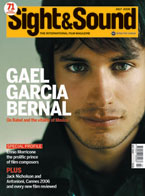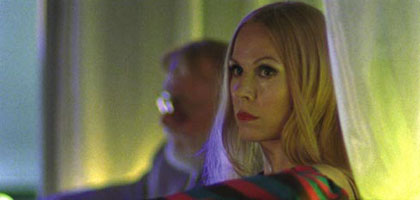Primary navigation

USA 2004

Reviewed by Ryan Gilbey
Our synopses give away the plot in full, including surprise twists.
Memphis, the present. Alan James, a white music producer who made his name in black soul, lives with Laura, a Russian woman many years his junior, and their three-year-old son, Sam. Alan's adult son, Michael, fails to arrive from Los Angeles in time for an industry ceremony honouring Alan.
After the ceremony, Alan disappears with another woman and Laura accepts a lift from a stranger. At home, Laura has an altercation with the stranger, witnessed secretly by Michael. While waiting for Alan at lunch the next day, Michael tells Laura what he saw, and she leaves. Later, he apologises, and they become close, eventually having sex.
At a nightclub, Michael attacks the stranger who harassed Laura. After sex with Alan, Laura cries uncontrollably; Alan suspects it is because he hasn't married her. April, Michael's girlfriend, arrives from LA. At a garden party, Alan proposes to Laura in front of their guests. Michael gives a bitter speech. That night, Laura has sex with one of Alan's friends in the woods. The next morning, she demands to speak with Michael moments before he and April leave for the airport. He refuses to reveal to Laura whether or not he loves April. Alan and Laura go out that evening, but Laura gets out of the car and disappears into the night.
The surging soul music of Memphis rings out too infrequently in Forty Shades of Blue to provide more than a passing optimistic counterpoint to the muted agony of the film's characters. Included on the soundtrack are numbers by the city's legendary
writer-producer Bert Russell Berns, who died in 1967; the screenplay also grafts details from Berns' background onto the fictional Alan James, a gruff titan living on his reputation as the key figure behind 1960s and 1970s Memphis soul. Alan is played by Rip Torn, though the word "play" doesn't do justice to the way the actor assaults the role. The baggage that he brings from his part as the bullying Artie on the HBO series The Larry Sanders Show makes each outburst increasingly fraught, each flash of vulnerability that bit more unnerving.
Alan communicates largely in speeches; he flounders when he's not holding court. Early in the film he delivers a précis of his career at a music-industry ceremony honouring his achievements. When his adult son, Michael, comes to stay, Alan can't resist quantifying his shortcomings in a monologue that might have been honed over many hungover mornings in front of the bathroom mirror. Michael has developed his own coping mechanisms: sitting in a studio control booth while his father harangues an engineer, he presses a mute button on the mixing desk, reducing Alan to a wildly gesticulating mime artist trapped behind the glass.
By the time Alan delivers his last speech of the film, proposing to his Russian girlfriend Laura over the PA system at a garden party, his bluster has subsided. Laura has found a temporary escape from her partner in the arms of his own son. Writer-director Ira Sachs is not so crude as to engineer soap-opera showdowns, but the incriminating looks and wounded reaction shots tell us that Alan is as cognisant of Laura's betrayals as she has been, throughout the film, of his. Playing Laura, Dina Korzun, scarcely seen since Paul Pawlikowski's /six years ago, looks so frail it seems Torn could snap her like a twig. But the alertness she brings to Laura reveals the character to be tougher than she first appears. Even through helpless tears, as she retreats from sex with Alan, she fabricates a reason for her distress that is so plausible even the audience is likely to be momentarily suckered despite knowing the truth.
Sachs, who brought sensuality and menace to his 1996 debut The Delta, makes an uncharacteristic error during that garden party scene: as Alan clutches Laura in a slow dance following his marriage proposal, Sachs replaces the music of the on-screen soul band with Dickon Hinchliffe's plangent score, undercutting the partygoers' merriment and translating Alan and Laura's woes needlessly into music.
The misjudgement seems glaring only because the movie has observed at all other times the rule of 'show, not tell' - and sometimes there isn't even any showing. Events that would feature far more prominently in a more conventional narrative - the reconciliation between Michael and Alan, Laura confronting Alan over his infidelities, Michael and Laura agonising over their affair - are treated fleetingly, or not at all. The picture concentrates instead on the moments of intimacy or isolation that these characters experience in their compartmentalised lives.
The sense of alienation is evoked perfectly by production designer Teresa Mastropierro. She transforms Laura's bathroom into a science-fiction hall of mirrors worthy of Barbarella, and turns her home into an unfriendly complex of hallways and split-levels, with shadows into which a person might stray and never be seen again. Also well-conceived is the recording studio where Laura, Michael and Alan are segregated most explicitly from one another. Laura is in one booth with her three-year-old son, who bashes a drum kit. In the main studio area, Alan plays the piano, apparently for his own amusement. A cut to the control booth reveals that his light-fingered solo is only one part of a percussive dance track; notes that previously floated in isolation are now part of a tidal wave of sound. From the control booth, Michael catches Laura's eye; they wave at each other from their soundproofed sanctuaries, with Alan still attending to the keys between them. It's a delicate, highly charged little ballet, staged without undue irony or emphasis. In this scene, as with so much else in Forty Shades of Blue, Sachs keeps the tone tentative, the camera and cutting fluid, and the motives tantalisingly oblique.